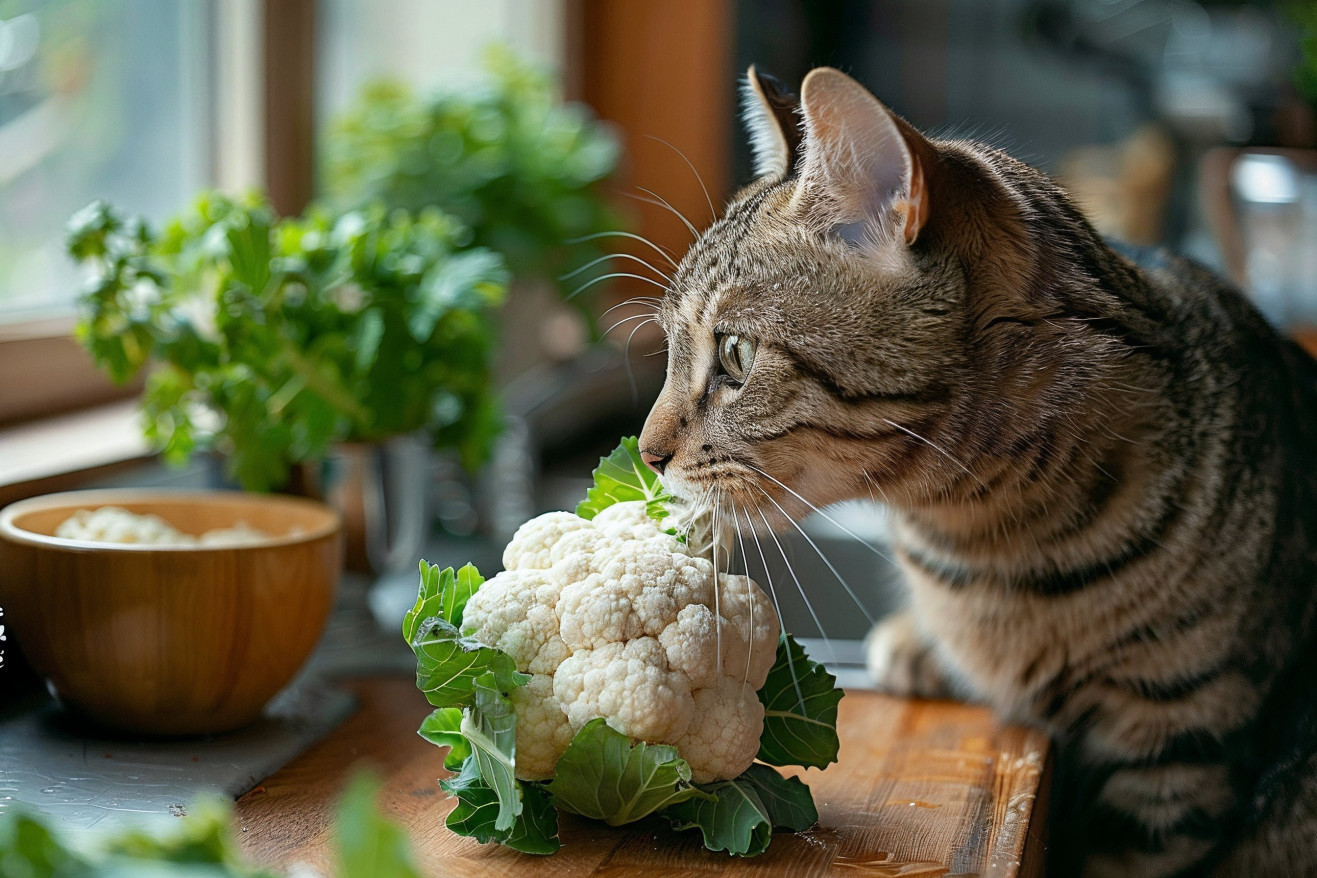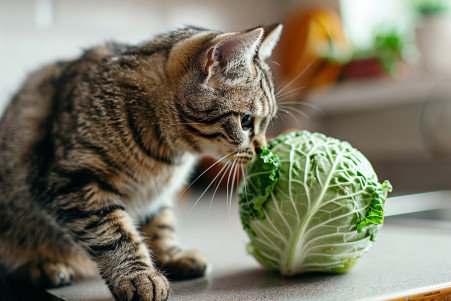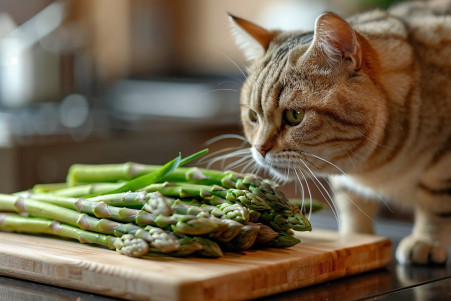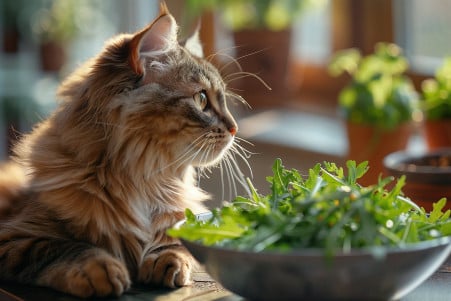Can Cats Eat Cauliflower? A Vet Weighs In on Feline Nutrition
24 April 2024 • Updated 23 April 2024

Even though cats are obligate carnivores, many people are curious if they can feed their feline friends human food like cauliflower every once in a while. Cauliflower is not poisonous to cats and does offer some nutritional value in the form of vitamin C and fiber, but it should be fed in moderation because cats don't process fruits and vegetables as well as other foods.
To dive deeper into whether or not cauliflower is a good choice for cats, we'll look at advice from vets and what cats need in their diets. This will cover information from the American Society for the Prevention of Cruelty to Animals (ASPCA) and studies that have been done on how well cats can digest vegetables compared to their natural diet. With a better understanding of what cats can and can't eat, as well as what they need in their diet, you can decide if you want to feed your cat small amounts of cauliflower as a treat.
Can cats eat cauliflower?
Nutritional Value of Cauliflower for Cats
Cauliflower is packed with a number of nutrients like vitamin C, vitamin K, and fiber, all of which could potentially have some health benefits for cats. For example, its anti-inflammatory properties could be helpful for cats with arthritis, according to advice from vets at Wamiz. That said, there is very little evidence that has looked at the nutritional value of cauliflower for cats.
While cauliflower is not toxic, it's important to note that cats are obligate carnivores and have different nutritional needs than humans. Cauliflower should never be used to replace a cat's main diet, which should be meat-based, but it can be used as an occasional treat in small amounts. Cats that eat too much of cauliflower's fiber may experience digestive issues like vomiting or diarrhea.
In the end, while cauliflower does have some nutritional value, it's unlikely to have a big impact on most cats' health beyond being a safe option for a vegetable treat. A balanced view is that cauliflower is nontoxic and safe for cats to eat in small amounts as an occasional treat, but it's not necessary for their diet. It's important to watch your cat's response to new foods, especially if they have a medical condition. In general, it's best to feed plant-based foods to obligate carnivores like cats in moderation.
Moderation and Watch for Adverse Reactions
As with any new food, cauliflower should be introduced to your cat in moderation to avoid any potential digestive problems, such as diarrhea or constipation. ManyPets notes that the high fiber in cauliflower can lead to gastrointestinal issues if cats eat too much. Vets recommend starting with very small amounts, such as 1-2 teaspoons per meal for an average-sized cat, and then increasing the amount based on your cat's reaction.
Owners should also be on the lookout for adverse reactions, such as vomiting, lethargy, or changes in bowel movements, after feeding their cat cauliflower. Lakeland Animal Clinic warns that you should talk to your vet, especially if your cat has any underlying health conditions, before making any major changes to their diet. The best way to ensure that your cat can tolerate cauliflower is to slowly introduce it and monitor their reaction closely before feeding it to them as an occasional treat.
How to Prepare Cauliflower for Cats
If you want to give your cat cauliflower, it’s important to prepare it properly. According to The Pet Liker, raw cauliflower can be hard for cats to digest, so it’s best to cook or steam it before giving it to your pet. Meanwhile, the leaves and stems of cauliflower are safe for cats to eat, but Petcube notes that the leaves should be removed because they may not be the best option.
Cauliflower should never be given to cats in a dish that includes seasonings, sauces, or other ingredients that could be toxic. PureWow recommends giving cats plain, cooked cauliflower with no added flavors. It’s also a good idea to introduce cauliflower to your cat’s diet in small amounts and watch for any adverse reactions before increasing the portion size. Finally, make sure the cauliflower is fresh, washed, and free of toxins.
How to Add New Foods to a Cat's Diet
If you want to add new foods to your cat's diet, such as cauliflower, it's important to do so slowly over the course of 7 to 10 days, per Wellness Pet Food's advice. This means starting with 25% of the new food and 75% of the old food and increasing the percentage of the new food every 2 to 3 days until you're at 100% new food. This slow transition can help prevent digestive issues like diarrhea and vomiting.
If your cat is a picky eater, PetMD suggests adding tuna juice or a moist treat to the new food to entice them to eat it. You can also try adding dry food on top of wet food or moving from a pate to a more meaty texture. Hill's Pet also notes that you should keep an eye on your cat's caloric intake if you're adding wet food to their diet and that you should talk to your vet.
No matter what the new food is, it's important to keep an eye out for digestive issues or food aversions when you introduce it to your cat. You should also talk to your vet before making any major changes to your cat's diet, especially if they have a health condition that requires a special diet.
Other Vegetables That Are Safe for Cats in Moderation
As noted by PureWow, vegetables can add some nutritional value to a cat's diet, especially if they're missing out on certain vitamins and minerals from their regular meat-based meals. That said, it's important to know which vegetables are safe for cats and how to prepare them for your pet.
Other vegetables that are safe for cats to eat in moderation include carrots, broccoli, celery, chickpeas, green beans, peas, pumpkin, spinach, and winter squash. Carrots and green beans can add fiber to your cat's diet, while chickpeas can add protein, iron, and other minerals. Pumpkin and winter squash have fermentable fiber that can help with digestion.
It's important to cook or steam these vegetables before giving them to your cat, as raw vegetables can be a choking hazard and can be hard for cats to digest. Cats.com also notes that vegetables should never be used to replace a cat's regular meat-based diet, but they can be used as a supplement or a treat. It's also a good idea to talk to your vet, especially if your cat has dietary restrictions or health issues, before introducing new foods.
Conclusion: Feed Cats Cauliflower in Moderation
Cauliflower can be a safe occasional treat for cats when fed in moderation, but it should not replace a cat's primary meat-based diet. It's important to understand a cat's unique dietary needs and digestive system when introducing new foods like cauliflower.
Owners should start with small portions, monitor their cat's reaction, and consult a veterinarian before making significant changes to their pet's diet, especially for cats with specific health conditions.
By following these guidelines and practicing moderation, cat owners can safely incorporate cauliflower as an occasional supplement to their feline's balanced, nutritious meals.


